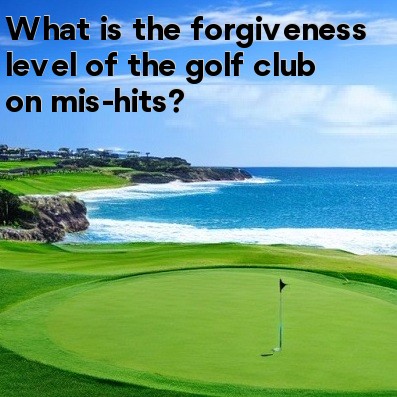
The Forgiveness Level of Golf Clubs on Mis-hits
Golf is a sport that requires precision and accuracy. Every golfer strives to hit the ball perfectly with each swing, but even the most skilled players are bound to have mis-hits every now and then. This is where the forgiveness level of golf clubs comes into play.
What is forgiveness in golf?
In the context of golf clubs, forgiveness refers to the club's ability to minimize the negative effects of mis-hits. When a golfer makes a mis-hit, the ball may not make contact with the clubface at the sweet spot, resulting in decreased distance and accuracy. However, clubs with higher forgiveness are designed to provide better results even on off-center hits.
Factors affecting forgiveness
Several factors contribute to the forgiveness level of a golf club:
- Sweet Spot: The sweet spot is the center of the clubface and is the optimal point of contact for maximum distance and accuracy. Clubs with larger sweet spots are generally more forgiving as they provide a larger area for successful hits.
- Weight Distribution: The distribution of weight throughout the clubhead affects forgiveness. Clubs with perimeter weighting, where the weight is distributed around the edges of the clubhead, enhance forgiveness by reducing the negative impact of off-center hits.
- Clubhead Shape: The design of the clubhead also plays a role in forgiveness. Many modern clubs feature a cavity-back design that moves weight to the perimeter of the clubhead, increasing forgiveness. On the other hand, blades are more commonly used by professionals and offer less forgiveness but greater control.
- Shaft Flexibility: The flex of the shaft can also impact forgiveness. Softer shafts tend to offer more forgiveness as they absorb some of the shock and stabilize the clubhead through impact.
The impact of forgiveness level on mis-hits
Golf clubs with higher forgiveness levels provide several benefits on mis-hits:
- Improved Distance: Off-center hits tend to lose distance due to less efficient energy transfer from the club to the ball. Clubs with higher forgiveness help maintain ball speed and distance even on mis-hits.
- Increased Accuracy: Mis-hits often result in shots veering off-target. Forgiving clubs help reduce the severity of wayward shots, improving accuracy and keeping the ball closer to the intended target.
- Enhanced Consistency: Golfers of all skill levels appreciate consistency in their shots. Forgiving clubs help minimize the dispersion of mis-hits, resulting in more predictable outcomes.
- Boosted Confidence: Knowing that a club is forgiving can instill confidence in a golfer's swing, leading to a more relaxed and fluid motion. This psychological advantage can contribute to improved performance on the course.
Finding the right forgiveness level for you
When selecting golf clubs, it's important to find the forgiveness level that suits your skill level and playing style. Lower handicap players may prefer less forgiving clubs to have greater control over ball flight, while higher handicap players often benefit from clubs with higher forgiveness to improve consistency and distance.
Ultimately, the forgiveness level of a golf club is a personal preference and depends on individual needs and goals. Trying out different clubs and seeking advice from a professional club fitter can help you find the right balance between forgiveness and control for your game.
In conclusion, forgiveness in golf clubs refers to their ability to minimize the negative effects of mis-hits. Factors such as sweet spot size, weight distribution, clubhead shape, and shaft flexibility contribute to a club's forgiveness level. Clubs with higher forgiveness provide benefits such as improved distance, increased accuracy, enhanced consistency, and boosted confidence. Finding the right forgiveness level for your game is essential in maximizing your performance on the golf course.





